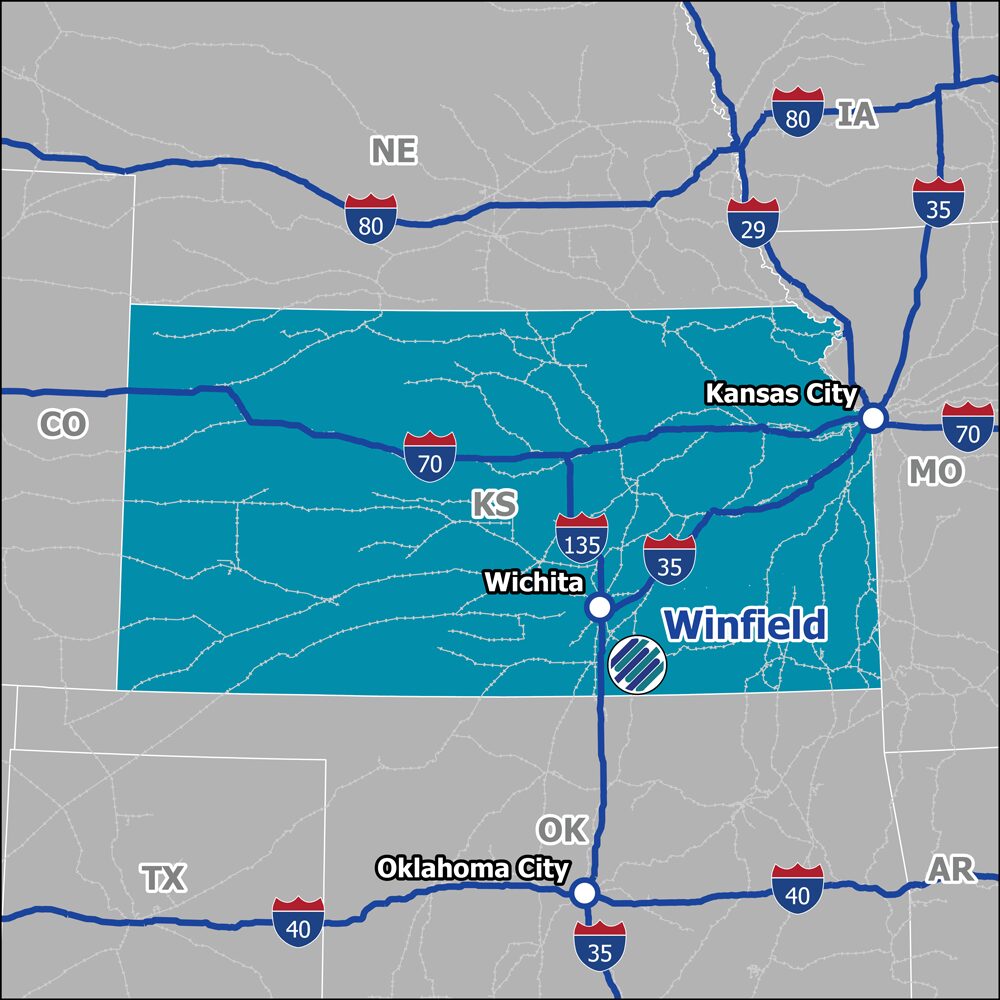Chances are many or most of the more than 350 workers at Newell Rubbermaid’s Winfield, Kansas, operation make time each third weekend in September to attend the Walnut Valley Festival National Flat-Picking Championships. The event, which attracts guitarists and other musicians from across the country, has been a Winfield tradition for 52 years.
Newell Rubbermaid’s roots in the area go back even further — 108 years — to 1916, when H.P. Gott Manufacturing started making water coolers for oilfield workers. Rubbermaid acquired the company in 1986; Newell acquired Rubbermaid in 1999. Today, Newell Brands Winfield Operations occupies 2.78 million sq. ft. of space on four campuses where it manufactures small and large indoor and outdoor refuse containers and large outdoor plastic sheds.
“Winfield has been chosen for multiple large projects throughout the years,” says Plant Manager Shane Milledge. “The City of Winfield, Cowley County and the state have been very supportive of new projects that create jobs, such as incentives for recruiting and training, as well as favorable tax programs. Additionally, the City of Winfield has worked closely with Newell and our site on utility rates as our process is very energy-intensive.”
Low-Cost Energy
City Manager Taggart Wall says Winfield’s electric utility is city-owned, and industrial electricity rates are 15% less than the national average with large industry paying 25% less than the national average, according to July 2024 numbers from the U.S. Energy Information Administration.
“With lower rates than competitors, companies can invest more in technology and product development rather than overhead costs,” Wall says. “Winfield’s robust, dedicated public water supply is poised to support additional growth, providing resiliency even through times of drought.”
Wall says the town’s skilled workforce with expertise in plastics, machine tooling and the aviation and space industries has been cultivated over generations in a community that values experimentation and innovation.
“The Greater Wichita area, which includes Winfield, has the number four skilled manufacturing workforce in the nation,” he points out. “Winfield has a strong education culture with a four-year liberal arts college, Southwestern College, and a two-year vocational workforce college that collaborate with industries, ensuring that every new generation can fill the needs of the evolving industrial landscape.”
Shane Milledge concurs.
“It’s an environment that creates a hands-on workforce that supports our technical needs,” he relates. “Additionally, Winfield is one to three hours from the University of Kansas, Kansas State University, Wichita State University, Oklahoma State University, the University of Oklahoma and Pittsburg State University as well as multiple community colleges with one, Cowley College, only 15 minutes away.”
Proximity to Wichita, Kansas’ largest city just 35 miles to the northwest, affords Winfield businesses access to what Wall calls “an impressive rural labor shed of 155,000 people, not counting those located in the Wichita workforce, which is another 350,000.”

Low Cost of Living
Another advantage for Winfield employers and their workers, says Wall, is the low cost of living.
“The Economic Research Institute tags Winfield’s cost of living at 21% less than the national average,” he points out. “The U.S. Bureau of Labor Statistics pegs Winfield labor input costs at 33% less than the national average. Winfield is a Rural Opportunity Zone, offering qualifying employees of industry a 100% state income tax credit and student loan repayment assistance.”
Winfield does not take its industry base for granted, says Milledge.
“On a daily basis, they support our utility needs and our utility infrastructure,” he says. “If a large transformer fails and shuts down large portions of our facility, they prioritize getting their teams on site and getting us running again as soon as possible. They keep us aware of state incentives that keep our overhead costs low. And they have sponsored and driven assorted projects to create affordable housing for our employees.”
More than 120 units have become available in the past two years.
The area’s infrastructure advantages include transportation. The Wichita metro also includes access to Interstate 35 with 90% of U.S. markets including Chicago, New York, and Los Angeles, reachable in a three days’ drive from the city. Additionally, notes Wall, Winfield’s industrial parks have rail access. Milledge says the extensive rail network in Winfield “allows us to bring in raw materials in bulk at favorable rates.”
Strother Field, a local airport, is six miles southwest of town. And a 60-acre City-owned site, says Wall, “has been vetted by the Kansas Department of Commerce as being primed for development and ready for investment.”
This Investment Profile was prepared under the auspices of the City of Winfield. For more information, visit www.winfieldks.org.

